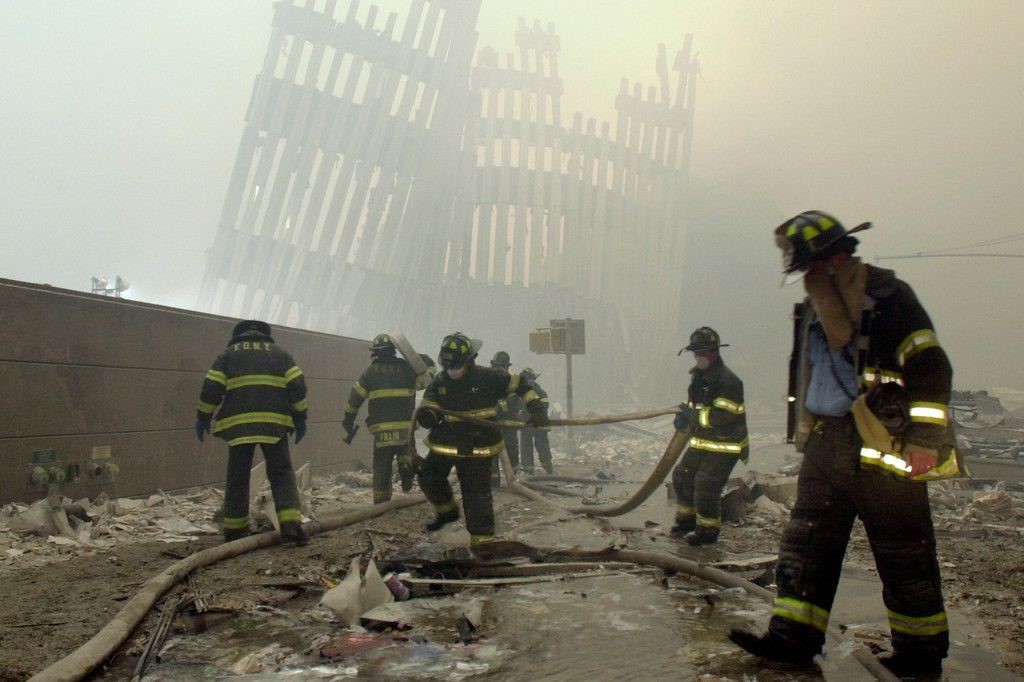The Bush administration argued that a belated reckoning with Saddam Hussein was necessary for the post-9/11 atmosphere. He had continued to support terrorism, invading or attacking four of his neighbors over the years, and killing tens of thousands of his own people. He was unquestionably a greater menace to the region and his own people than Bashar Assad or Moammar Qaddafi eight years later. In this environment, the end of the 1991 Gulf War loomed largely: its conclusion had resulted in mass death of Kurds and Shiites, rather than the expulsion of a defeated Saddam. Twelve years of no-fly zones had witnessed times of violence, and their enforcement no longer drew much, if any, international backing, implying that Saddam would soon be able to restore his regional status. Many of the architects or important participants in the 1991 war were back in power in Washington, and many of them had become resentful of the previous conflict’s conclusion over the decade. After 9/11, the sense of urgency to fix a mistake was even stronger. Similarly, there would have been no 2003 invasion if the 1991 Gulf War had ended differently, or if the United Nations and NATO allies had continued to actively engage in the no-fly zones and containment of Iraq.

The Iraq War was justified, rightly or wrongly, on the assumption that the previous war with Saddam Hussein had failed and that containment would fail, and that, after 9/11, it was time to end a sponsor of global terrorism who should have been ended in 1991 — a decision that, incidentally, would save Kurdistan and allow it to become one of the most successful and pro-American regions in the Middle East. Another cause was the quick success in the war in Afghanistan following 9/11. On the eve of the October 2001 invasion, academics and commentators predicted disaster. Even if it succeeded in overthrowing the Taliban, any prospect of postwar peace was proclaimed unachievable, given the region’s history as a “graveyard of empires.” However, the unanticipated eight-week war that easily ousted the Taliban, as well as the nonviolent manner in which pro-Western Hamid Karzai later assumed power, led the administration and the country to believe that Iraq would be a far less difficult prospect — especially given Iraq’s humiliating defeat in 1991, which contrasted sharply with the Soviet failure in Afghanistan. After all, in contrast to Afghanistan, Iraq had easy ports, pleasant weather, flat terrain, a significantly more literate citizenry, and oil – factors that, paradoxically, would help to explain why David Petraeus eventually succeeded there in a way that his subsequent efforts in Afghanistan did not. Knowing that the US had clearly succeeded in two months where the Soviets had failed miserably for a decade, and given that we had previously defeated Saddam, it looked plausible that Iraq would follow Afghanistan’s success. There are several examples of historical misinterpretations: The French felt in 1940 that they could hold off the Germans for four years, as they had done in the First World War; the Germans assumed the Russians would be as weak at home in 1941 as they had been abroad in Poland and Finland in 1939–40. The US would not have invaded Iraq if Afghanistan had been as difficult at the start of the war as it was at the conclusion. The tremendous bipartisan support in Congress, the media, and the general public — for reasons other than WMD — was the third factor. Bill Clinton’s 1998 Iraq Liberation Act was updated in October 2002, when both chambers of Congress issued 23 writs supporting Saddam’s removal. Senators Hillary Clinton, John Kerry, and Harry Reid were among those who not only campaigned for Saddam’s removal but also cautioned about intelligence estimates of his WMD arsenals. Pundits on all sides, from Thomas Friedman to George Will, backed the invasion, which had over 70% approval from the American people on the eve of the war. In that aspect, Bush had accomplished what Clinton had not on the eve of the Serbian War: he had gotten a joint resolution of support from Congress before fighting, and he had spent almost a year trying (albeit failing) to get the United Nations to approve Saddam’s departure. Bush would not have invaded Iraq if he had not gone to Congress, made no attempt to go to the United Nations, had no popular backing or had been opposed by the leftist press. The threat of WMD was the fourth factor. While the Bush administration could have easily cited the bipartisan resolutions’ persuasive writs — genocide against Kurds, Shiites, and Marsh Arabs; bounties for suicide bombers; a sanctuary for terrorists; assassinations of former US presidents; violations of UN sanctions and resolutions; and so on — it instead focused on supposedly unimpeachable intelligence about WMD, a “slam dunk,” according to CIA Director George Tenet, a judgment This focus on weapons of mass destruction would be a major political blunder. It’s worth noting that the eventual public outcry over missing WMD stockpiles (despite solid evidence that Saddam was dangerously close to deploying WMD) did not begin with the discovery of that intelligence failure, but rather with the mounting violence following a seemingly brilliant victory over Saddam.

The conveniently coined phrase “Bush lied, thousands died” was born because of the missing large stocks of WMD. However, if the rebuilding had gone successfully, we would not have heard things as “Bush lied — hence there was no need to topple Saddam and nurture consensual government in Iraq after all.” Without the threat of WMD, the Bush administration reportedly concluded that the other writs would not generate enough public urgency for preemption, and so would not have attacked Iraq. Note that when Barack Obama talks about “red lines” and “game-changers” in Syria that might justify US preemptive action, he isn’t referring to the 70,000 dead, Bashar Assad’s horrific human-rights record, Syria’s past attempt to go nuclear, or even the plight of millions of Syrian refugees, but rather the suspicion that Syria is planning to use chemical or biological weapons — a crime Saddam had frequently committed against his own people and one that inflames public. As a sidebar, we won’t know the complete story of WMD in the region until the Assad regime leaves Syria — yet we’re starting to hear the Obama administration express similar concerns about Syrian weapons as we did about Iraqi weapons during the Bush presidency. A fifth motive was the idea of reshaping Iraq so that it would no longer be a problem in the area, but rather a solution. Since the 1991 war did not end well due to a failure to finish off the regime and remain on, and since help to insurgents fighting the Soviets in Afghanistan was followed by U.S. indifference and, eventually, the emergence of the Taliban, the US was resolved to stay this time. We have forgotten the liberal consensus that the Taliban’s ascent and Saddam’s survival were meant to be reflections of previous US callousness, not to be repeated in Iraq. Finally, America would do the right thing and form a consensus government that could secure not just the end of Saddam’s horrors, but also put pressure on Gulf monarchies to liberalize and stop supporting terrorism like the one that murdered 3,000 Americans. While some neo-cons may have believed that Iraqi democracy would be followed by a true Arab Spring of US-backed democracy sweeping the Middle East — something akin to the initial goodwill generated by Pakistan’s detention of Dr. Khan, Qaddafi’s surrender of his WMD arsenal, and Syria’s departure from Lebanon before it all fizzled out with Fallujah — most Bush administration policymakers believed that democracy was not their first, but their last option. Officials in the Obama administration hoped for a situation similar to post-Milosevic Serbia or post-Noriega Panama, rather than Somalia or post-Soviet Afghanistan. Keep this in mind: Congress would not have supported an invasion of Iraq if George Bush had simply said in advance that he would leave Iraq as soon as Saddam was removed, or that he planned to replace Saddam with a less violent cousin to keep order while we were gone. The Iraq War was pitched in part on the liberal idealism of finally doing the right thing after failing to do so against Saddam Hussein and following the Soviets in Afghanistan. The issue of oil was the sixth and last item on the list. The Bush administration would not have attacked Iraq if it had been Rwanda. The point here is to recall that the war was not about “blood for oil,” since the Bush administration had no intention of acquiring Iraqi oil, as seen by the open and non-US development of Iraqi oil and gas reserves after the war.
Instead, oil was an issue because Iraq’s oil revenues meant that Saddam would always have the resources to foment unrest in the region, would always be difficult to remove through internal opposition, and would always use petrodollar influence to undermine United Nations resolutions, seek to spike world oil prices, or distort Western solidarity, as evidenced by the French collusion with Saddam. Consider North Korea with Iraq’s gas and oil reserves: the threat it poses to its neighbors would be substantially exacerbated, and the problem would be a lot more likely to be handled. The US would not have attacked Iraq if it had been a resource-poor Yemen or Jordan, or if it had been landlocked without crucial access to the Persian Gulf.






